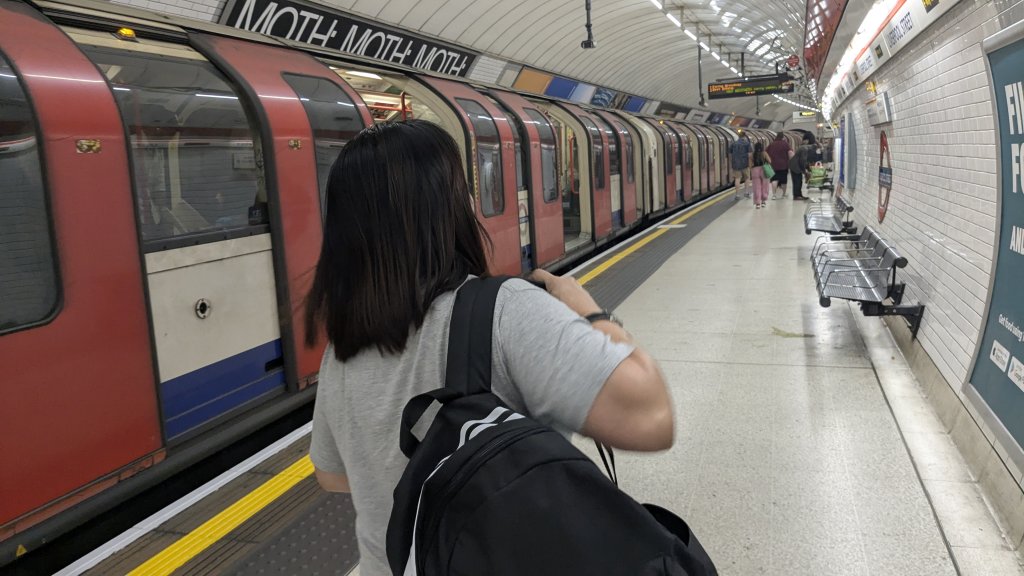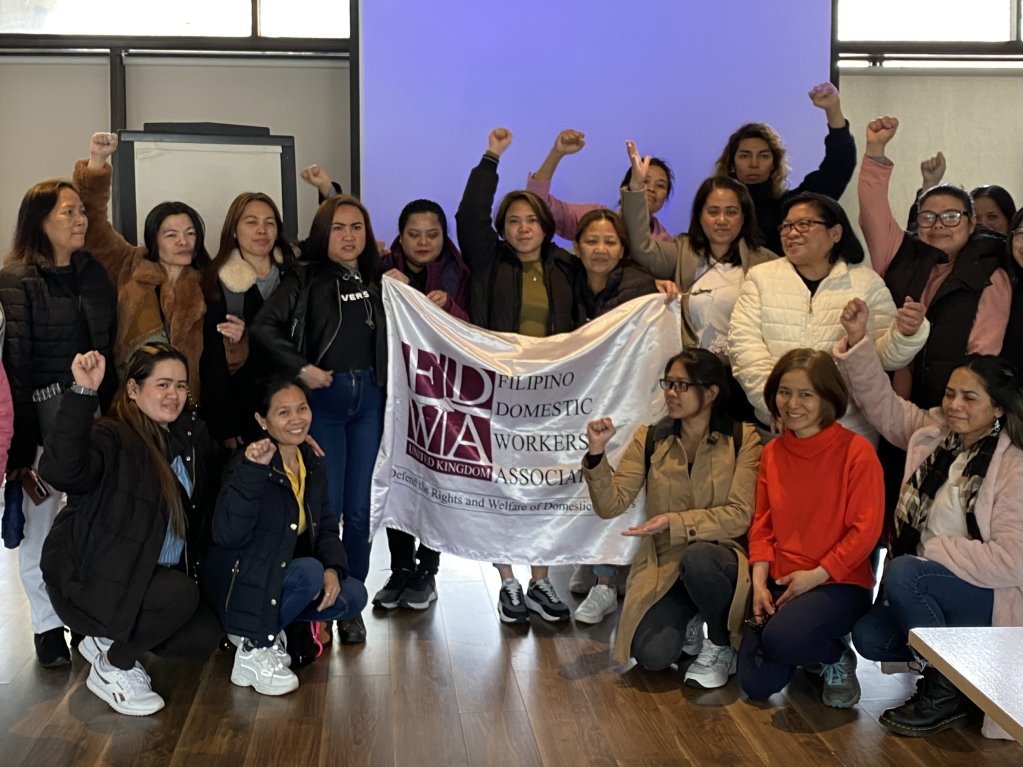Complex immigration rules and bureaucratic backlog in the UK's National Referral Mechanism leave some migrant domestic workers who have escaped abusive employers without the right to work, leaving them trapped in a grey zone of being freed from exploitation but facing ongoing uncertainty and insecurity.
More than anything, Cynthia* wishes that she had the right to work. The backlog of bureaucratic paperwork and the technicalities of complex immigration regulations have pushed the 42-year-old into a grey zone that allows her to stay in the United Kingdom, but not legally work there.
Cynthia, 42, came to the United Kingdom in June 2023 under a Foreign Domestic Worker Visa that her employer secured for her. By that time, she had been working for them as a domestic worker for four years, first in Dubai.
There, her life was not her own. Every hour of her day was controlled and accounted for. Cynthia worked grueling 12 to 16-hour days, starting at 5 am and collapsing into bed after 10 pm. There were no days off. Even her phone use was restricted.
Her employer sent her salary directly to the Philippines, and would show her wire transfer receipts. But she never saw or held the money herself. Her employer insisted she did not need to. They provided essentials like toiletries, and if she needed something extra, they promised to give her additional cash.
"I endured all of that for the sake of my family," said Cynthia. As the sole breadwinner, Cynthia’s four children, husband, grandchild, and aging parents depended on her monthly remittance for their daily needs.
An alibi and an escape
Her same employer, whom she describes as a wealthy entrepreneur, secured a Foreign Domestic Worker Visa for her in 2023. Within a month of being in the UK, it became clear that her working conditions would not improve. Cynthia’s work hours remained gruellingly long, and her movement outside of the flat in the port city southwest of central London was limited not just by her workload, but by fear.
"My employer told me that if I went out without them, the police would get me. Of course, I believed them. I didn’t know anything else."
Once, her female employer even offered to "loan" her to one of her friends, instructing Cynthia to clean their home. She was not paid extra for the additional work.
Cynthia felt depressed when she would look out the window of the high-rise flat and see the tourists coming out of cruise ships. "The wall of the flat is glass, so you can see everything. I saw people from below, they were laughing, they were free to go anywhere, even on Saturday and Sunday," she said.
Cynthia witnessed simple joys that seemed like they were not meant for her.
A worried friend posted about Cynthia’s predicament on a Filipino community Facebook page. Another Filipino woman reached out to Cynthia and told her she knew people who could help.
A tight ring of trusted referrals came to her aid to plan her escape.
Cynthia still remembers how she "packed" extra clothes by wearing three bras, three shirts, and eight pieces of underwear all under her maid's uniform.
Under the pretense of taking out the garbage, Cynthia stepped out on the street where a woman was expecting her. The woman simply said, "Don’t say anything," and motioned for Cynthis to follow her.”
Their first stop was a public toilet where the woman handed her a t-shirt, a pair of jeans, and a cap to change out of the maid's uniform.
Then they walked as casually as possible to the train station. "My legs were so heavy. I was so nervous. I just kept praying, ‘Lord, whatever happens, I offer everything to you.’"
Read AlsoUK: Calls to a modern slavery helpline at 'record high' in 2023
Grey zone
For months, Cynthia stayed in the care of the people who took her in. She describes them only as kind people whom she trusted completely. She declines to share more details, fearing that their Good Samaritan gesture would backfire against them.
Cynthia had escaped but found herself terrified to leave the house. She had heard news reports about the government’s plans to deport people without valid immigration status to Rwanda. Though she had come legally on a Foreign Domestic Worker visa, she was haunted by the warnings of her employer about the police coming to get her.
When her employer reported her missing, police eventually came knocking. But Cynthia told them her story -- and they listened. One proof of her account: her passport was still in her employer’s possession.

Cynthia was placed under the government's National Referral Mechanism (NRM), a program designed to help foreign domestic workers who came to the UK and ended up in abusive situations with their employers.
While the NRM does not serve as a visa or a signifier of an asylum status, it is designed to provide support after a migrant escapes an abusive employer. It allows people under the NRM to stay in the UK while their case of possible human trafficking or modern-day slavery is being evaluated.
Under certain circumstances, it can also allow those affected to work temporarily. Unfortunately, as Cynthia explains, the right to work while waiting for the NRM decision did not apply to her.
Read AlsoUK: Survey of 200 migrant domestic workers reveals extent of employer abuse
Limitations of NRM
Cynthia’s foreign domestic worker visa expired before she received the first "reasonable grounds decision" from the NRM, the initial step to evaluate the merits of her case of human trafficking and modern-day slavery.
Because of this, she was not allowed to work while waiting for the final decision.
The timing between the first and second NRM decisions impacts worker rights. If someone receives a first positive decision within the six-month validity of their visa, they are allowed to work while waiting for the final decision. However, if the first positive decision comes after the visa has expired, the person is not permitted to work during this waiting period.

It can take up to two years for the NRM to issue a final conclusive decision.
This creates a difficult situation for many domestic workers, as most need to keep working to support their families.
Employers who hire workers without proper authorization face heavy fines and jail time, while workers who work without permission risk detention and problems with their immigration status.
Worker rights groups have widely criticized this limitation of the NRM as forcing many migrant workers to work in the hidden underground economy with even fewer protections for redress against poor working conditions.
Florence Yilmaz, co-founder of the United Domestic Workers Association (UDWA), criticized the NRM as "a band-aid solution".
"The provisions of the NRM are blind to the needs of migrant domestic workers who have been trafficked by their employer," Yilmaz told InfoMigrants.
Yilmaz, together with other UDWA members, has helped migrant domestic workers from the Philippines, Sri Lanka, and Africa escape their abusive employers. After escape, said Yilmaz, the most pressing need for the workers is to find a job and send money to their families back home as soon as possible.
"Not having the right to find employment puts the workers at even higher risk of being exploited again," said Yilmaz.
Read AlsoUK: Migration crackdown risks trapping victims in slavery
The right to work
For nearly two years since escaping her employer and entering the NRM program, Cynthia has survived on the weekly NRM subsistence allowance of just 38 British pounds. To make ends meet, she relies on food banks and charity vouchers from organizations like the Salvation Army. When friends invite her out for a meal, they understand that she can only go if they cover the cost.
However, what weighs on Cynthia the most is her housing situation. While NRM offers limited housing support, UDWA co-founder Yilmaz told InfoMigrants that many opt not to take it because some accommodations can be in far-off areas, leaving the workers feeling more isolated and cut off from the lifeline of care provided by community groups.
Cynthia moves from one friend’s home to another, carefully spacing out her stays so she doesn’t overstay her welcome. "Sometimes I can’t help but feel sorry for myself. I just want to know what it’s like to have my own place — even just a little privacy," she admits.
A few weeks ago, Cynthia finally received a conclusive and positive decision from the NRM. “When I read the email, I felt like I could finally breathe again,” she said.
But the relief is tempered by the complicated process ahead.
After a positive, conclusive grounds decision, a new phase begins. The Home Office must assess each case to determine how much longer the migrant can remain in the UK. This decision takes into account factors like ongoing legal proceedings, compensation claims, and any special personal circumstances that need consideration.
It means more paperwork and more bureaucracy -- details her caseworker will explain to her.
But really, the one thing Cynthia wants to know is: When will I have the right to work?
*name has been changed to protect the identity of the respondent
